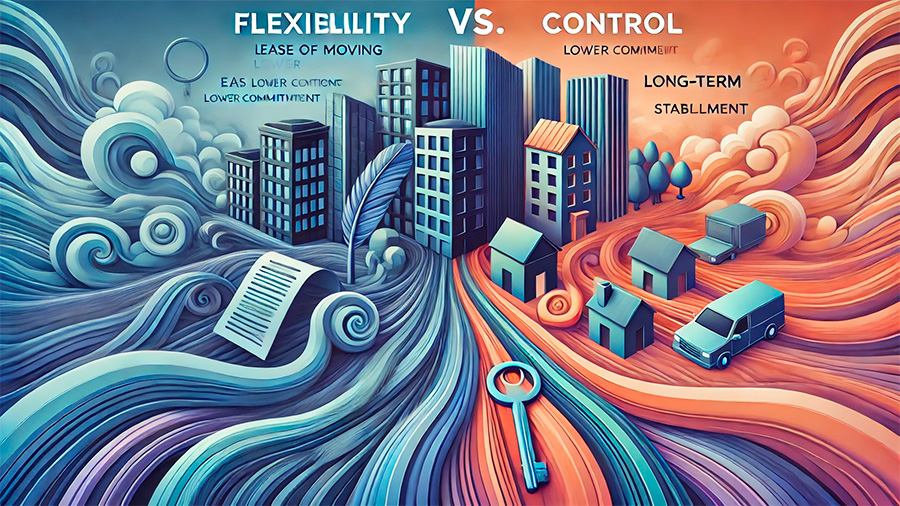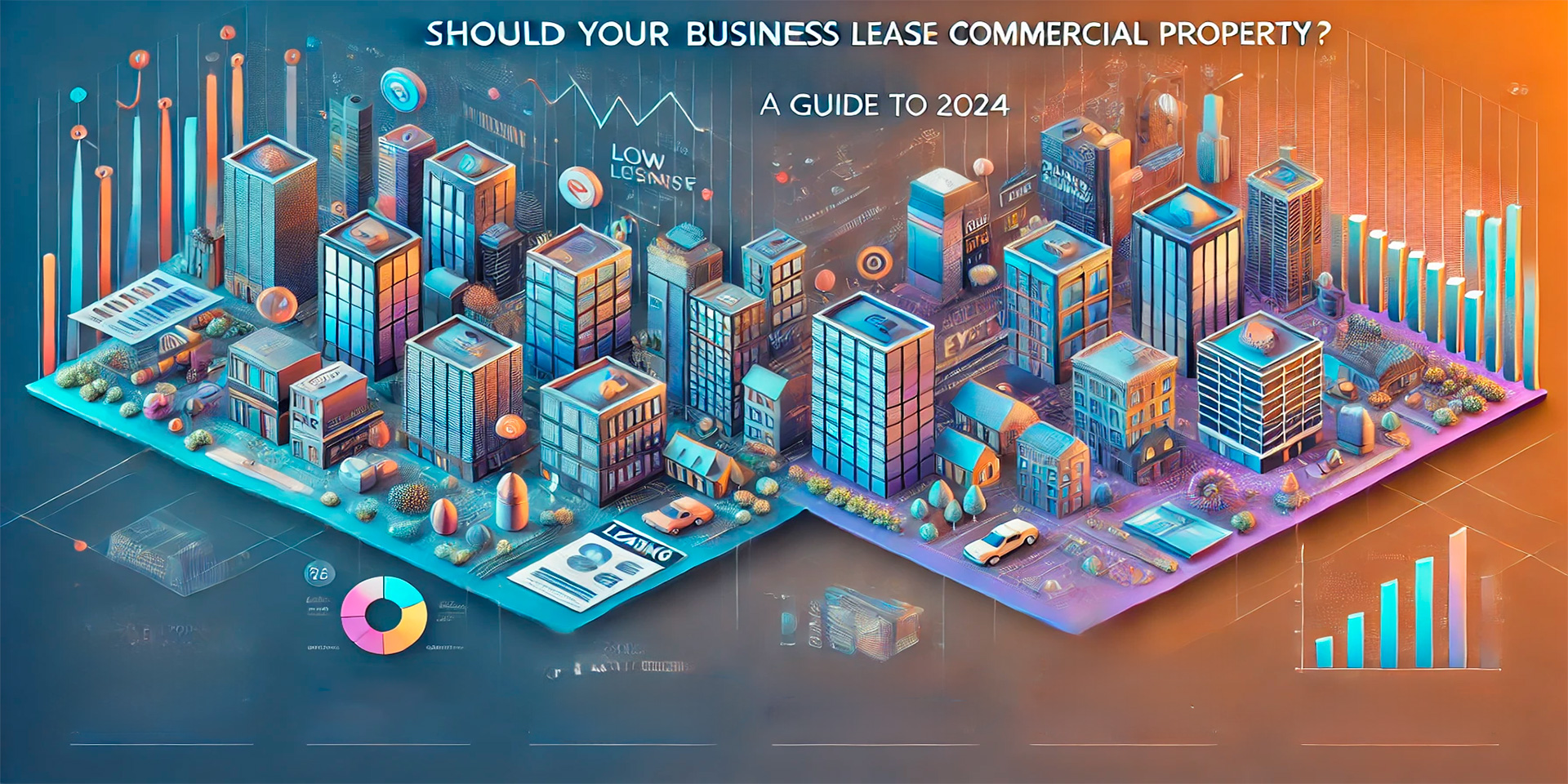One of the most significant decisions a business owner faces is whether to lease or buy commercial property. The right choice depends on various factors, including your financial position, business goals, and the current market conditions. Each option has its own set of advantages and disadvantages, and understanding these can help you make an informed decision that aligns with your long-term business strategy. This article explores the key considerations for business owners when deciding between leasing or buying commercial property.
Financial Commitment: Leasing vs. Buying
The financial implications of leasing versus buying commercial property are often the most important factor for business owners. Each option requires a different approach to managing capital and long-term financial obligations.
Lower Upfront Costs with Leasing
Leasing a commercial property requires significantly lower upfront costs compared to buying. Typically, leasing involves paying a security deposit, the first month’s rent, and possibly some legal or administrative fees. This makes leasing an attractive option for businesses that want to conserve capital or invest it in other areas of their operations, such as marketing, staffing, or inventory.
Leasing is particularly beneficial for startups or growing businesses that may not have the financial resources to make a large upfront investment in property. By minimizing the initial financial outlay, businesses can maintain more liquidity to fund their operations and growth.
Building Equity with Buying
On the other hand, buying commercial property requires a substantial upfront investment. You’ll need to cover a down payment—typically 10% to 25% of the purchase price—along with closing costs, property inspections, and other fees. While the initial costs are higher, buying allows you to build equity in the property over time.
As you pay down the mortgage, you increase your ownership stake in the property. Additionally, if property values rise, you stand to benefit from appreciation, potentially turning your commercial space into a valuable asset that can be sold or rented out in the future. For businesses with a long-term presence in a specific location, purchasing property can be a smart investment that leads to financial gains over time.

Flexibility vs. Control
When deciding whether to lease or buy, it’s important to consider how much flexibility you need versus how much control you want over the property. Both options offer different levels of freedom and responsibility.
Flexibility in Leasing
Leasing offers flexibility that is particularly appealing to businesses in fast-changing industries or those unsure of their long-term space needs. Most commercial leases range from three to five years, giving you the opportunity to move to a different location at the end of the lease term if your business grows or if your location needs change.
Additionally, leasing allows you to avoid the responsibilities of property ownership, such as maintenance, repairs, and dealing with structural issues. In many lease agreements, these responsibilities fall on the landlord, which can free up time and resources for business owners to focus on their core operations.
This flexibility can be especially valuable for businesses experiencing rapid growth or those that may need to relocate due to changes in market conditions or business strategy.
Control and Stability in Buying
Buying commercial property provides a high level of control over the space. As the owner, you have the freedom to make renovations or modifications to suit your business’s needs without seeking approval from a landlord. This can be crucial for businesses that require specific layouts or customizations that may not be possible in a leased space.
Additionally, owning the property offers long-term stability. With a fixed-rate mortgage, you can predict your property-related expenses over time, without worrying about rent increases or changes in lease terms. This stability can be particularly advantageous for businesses that plan to remain in the same location for many years, as it allows for better financial planning and control over operating costs.
Tax Implications
Tax considerations are another important factor when deciding between leasing and buying commercial property. Both options offer distinct tax advantages, but they affect your finances differently.
Tax Benefits of Leasing
One of the key tax benefits of leasing commercial property is the ability to deduct lease payments as a business expense. This means that the full cost of rent is deductible, which can help reduce your taxable income. Additionally, other expenses associated with leasing, such as utilities, insurance, and maintenance, are also typically deductible.
Leasing allows you to enjoy tax savings without the burden of property ownership, making it a more attractive option for businesses that need to manage cash flow or reduce their tax liability in the short term.
Tax Benefits of Buying
While leasing offers immediate tax deductions, buying commercial property can provide long-term tax advantages. As a property owner, you can deduct mortgage interest payments and property taxes, which can significantly lower your overall tax liability. Additionally, you can depreciate the value of the property over time, further reducing your taxable income.
Owning property may also provide capital gains tax benefits if the value of the property appreciates and you sell it for a profit. For businesses looking for long-term tax strategies and wealth-building opportunities, purchasing commercial real estate can be an effective way to leverage tax advantages.

Market Conditions and Timing
The decision to lease or buy commercial property is also influenced by current market conditions. Understanding the local real estate market and economic trends can help you make a more informed decision.
Leasing in a Hot Market
In competitive real estate markets where property values are high, leasing can be a more affordable option. If property prices are inflated due to high demand, buying may not make financial sense, as the cost of ownership could outweigh the benefits of building equity. In such cases, leasing allows you to secure a prime location without the large financial commitment of purchasing a property.
Leasing is also beneficial in volatile markets, where property values may fluctuate significantly. In these conditions, renting provides flexibility, allowing you to avoid the risks associated with property depreciation.
Buying in a Buyer’s Market
If the commercial real estate market is experiencing a downturn or if property prices are low, buying may be the better option. In a buyer’s market, you can purchase property at a lower cost, potentially securing a valuable asset that appreciates over time. Lower interest rates and favorable financing options can also make purchasing more attractive in certain economic conditions.
Additionally, if your business is in a stable industry and you plan to stay in the same location for many years, buying property can provide long-term savings compared to leasing, especially if rents are expected to rise in the future.
Exit Strategy and Long-Term Planning
Before making a decision, it’s essential to consider your long-term business goals and how they align with the property. Whether you plan to lease or buy, having an exit strategy is crucial for ensuring your decision supports your future plans.
Leasing and Flexibility for Growth
If your business is in its early stages or experiencing rapid growth, leasing may provide the flexibility you need to scale. You can negotiate shorter lease terms or include options to expand into additional space if your business grows. Leasing also allows you to avoid the hassle of selling a property if your business relocates or downsizes.
Buying as a Long-Term Investment
For established businesses with stable cash flow, buying commercial property can be a smart long-term investment. Owning property provides the potential for appreciation, allowing you to build wealth over time. Additionally, if your business outgrows the space or relocates, you can lease the property to generate passive income or sell it for a profit.
If your long-term goal is to create a permanent business location or build a real estate portfolio, purchasing commercial property aligns with those objectives. However, it’s essential to ensure that the property fits your long-term needs and is located in an area with growth potential.
Conclusion: Leasing vs. Buying for Your Business
Deciding between leasing and buying commercial property is a major decision that depends on your business’s financial health, growth plans, and market conditions. Leasing offers flexibility, lower upfront costs, and the ability to adapt to changes in your business, while buying provides long-term stability, equity building, and control over the property.
By carefully evaluating your financial situation, business goals, and the current real estate market, you can make an informed decision that supports your business’s success in both the short and long term. Whether you choose to lease or buy, aligning your property strategy with your overall business objectives is key to making the right choice in today’s market.
